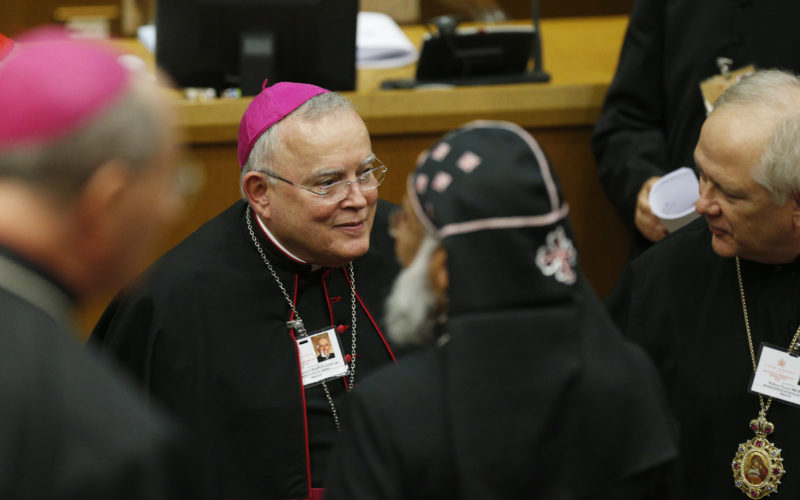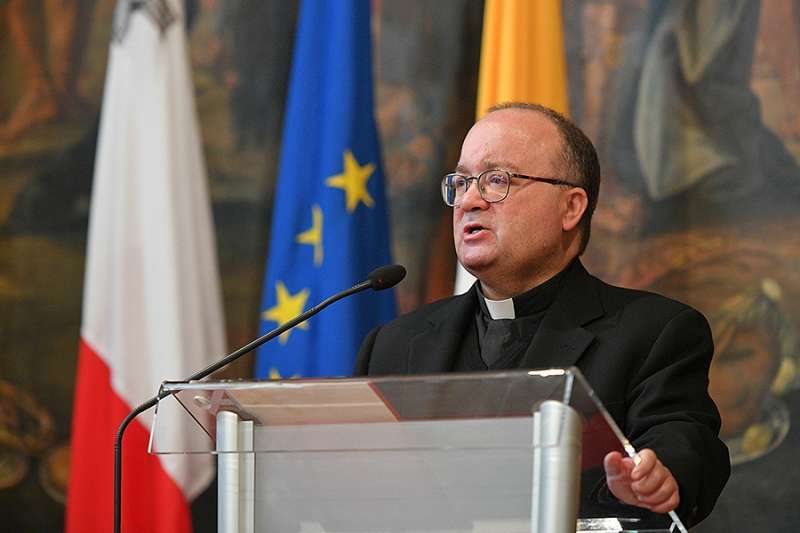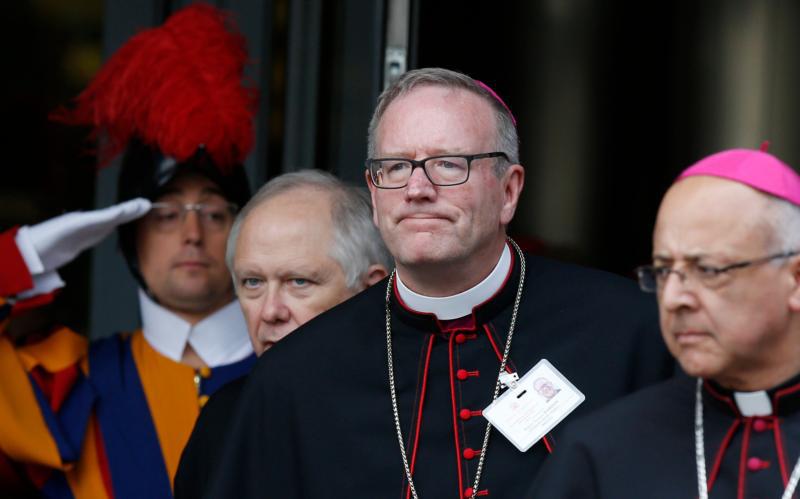The Synod of Young People finishes its first full week today and – it has to be said, at least based on what’s emerged from the closed sessions – the whole exercise seems to be in a holding pattern. Preaching the old theological virtues of Faith, Hope, and Charity to adolescents may not be the best catechetical approach to a profoundly under-catechized generation that needs considerable preparation before it can even grasp the significance of such Christian basics. But it’s not clear that endless repetitions of Listening, Openness, and Accompaniment will fare much better. Let’s hope that changes in coming weeks.
And there’s been little else – other than the abuse crisis and its effect on attitudes towards the Church – being discussed for the most part. The exceptions have been, if one may put it this way, exceptional.
We had a contribution early on from Archbishop Chaput that warned other bishops about flattering young people by making it seem that they – the young – had so very much to teach the Church; and that the Church had relatively little to propose in return. Speaking of paragraph 51 of the Working Document guiding the deliberations, he observed:
I believe [para] graf 51 is misleading when it speaks of young people as the “watchmen and seismographs of every age.” This is false flattery, and it masks a loss of adult trust in the continuing beauty and power of the beliefs we have received. In reality, young people are too often products of the age, shaped in part by the words, the love, the confidence, and the witness of their parents and teachers, but more profoundly today by a culture that is both deeply appealing and essentially atheist.
Chaput also had the courage and clarity to assert that: “LGBTQ” and similar language should not be used in Church documents, because using it suggests that these are real, autonomous groups, and the Church simply doesn’t categorize people that way.”

Virtually every speaker since has preferred to use the rhetoric of openness and welcome to duck a confrontation over the obvious clash between Christian morals and contemporary mores.
Without quite being as blunt as Chaput, Malta Archbishop Charles Scicluna spoke during a briefing yesterday about what Pope Francis has called “solidarity between the generations,” particularly the importance of young people talking with grandparents about the faith. This expands the horizon too, of course, and brings some wisdom to bear on the current moment.
Scicluna is the Vatican’s Number 1 abuse investigator; Pope Francis sent him to Chile to investigate and he produced a comprehensive report on that situation, a model for what needs doing in a number of other nations as well. Many of us would like to see the pope send him to America.
So when Scicluna said yesterday, that they’re slowly getting a grip on the abuse crisis, but will address it more comprehensively in the February meeting of heads of bishops’ conferences, you feel inclined to cut him a little slack. Especially since he said, quite realistically, that most of the healing that is going to get done is going to take place, relatively quietly, at the level of parishes and other concrete places. The controversies can distract us from that. Or as he put it: “A tree that falls in a forest makes more noise than a forest that is growing.”

We’ve also had a rather good “intervention” – not a crisis moment, but the Italian word for the remarks people make during the synod – from another American, Bishop Robert Barron. Through his Word on Fire project and other activities, he’s been engaging young people for years and understands trying to “reach them where they are.” But like Chaput, he is realistic about precisely where many young people are to be found:
Innumerable surveys and studies over the past ten years have confirmed that young people frequently cite intellectual reasons when asked what has prompted them to leave the Church or lose confidence in it. Chief among these are the convictions that religion is opposed to science or that it cannot stand up to rational scrutiny, that its beliefs are outmoded, a holdover from a primitive time, that the Bible is unreliable, that religious belief gives rise to violence, and that God is a threat to human freedom.
This has been one of the few references to actual intellectual content in evangelizing, which almost seems a non-starter, if not a definite obstacle, for the other participants. In other words, even as you try to reach young people, you have to recognize the deep imprint of a culture that denies the very starting points of faith and introduce them to a richer and deeper version of reason.
A lot of the discussion rightly says the Church must introduce people to Jesus, but doesn’t go much beyond that to explain why that’s important or who Jesus is.
There have been some questions about exactly which young people the synod is looking to reach. Young participants are mostly practicing Catholics. But the pope, bishops, and lay people have been speaking extensively, according to some reports, about agnostics and atheists, those who have been turned off by the Church and those never turned on.

The Church has been entrusted with the responsibility to preach the Gospel to all nations and exploring all avenues is part of that mandate. But the sheer number of problems and obstacles to evangelizing the young can, without careful attention, give rise to complex and sometimes seemingly conflicting approaches.
All this might remind you of how the early Church also had to make its way in a hostile pagan culture. We know that two things about the Christians especially impressed the pagans in the Roman Empire.
First, they were willing to die for the faith. Some pagans – like the 3rd-century physician Galen – thought the Christians were fanatics, but was still impressed by the peacefulness and courage with which they faced death. In the ancient world, which did not have the medical technologies we have to usher us off this mortal coil, virtue in the face of death was the ultimate achievement of philosophers. Socrates had it, but few others got there. To the pagans, the Christians – quite a few of them ordinary folk facing brutal persecution – could do what only the rarest pagan philosophers did.
Second, the Romans were impressed by the charity Christians showed. As the apostate Emperor Julian remarked, the pagans had nothing like the strong Christian network of mutual help and relief. He thought it was somewhat hypocritical, but it impressed him nonetheless. (One reason for his apostasy was that his Christian cousin Emperor Constantius II had slaughtered his close relatives, including his mother and father.) It must have impressed ordinary folk too, since the Empire had many Christians prior to the end of persecutions and legalization of the Faith.
So: ultimate commitment to the point of willingness to die for the truth and conspicuous love towards the neighbor. In other words, the classic paradigm for every wave of Church growth or renewal over two millennia, which was established early in Christian history. Maybe we should talk a bit less about listening and welcoming in the weeks to come, and more about this potent mix: faith, reason, charity.














